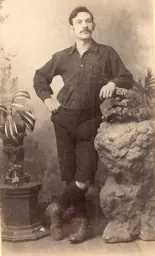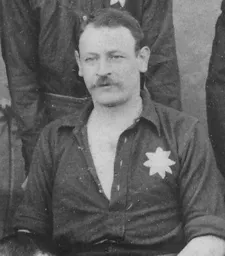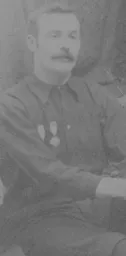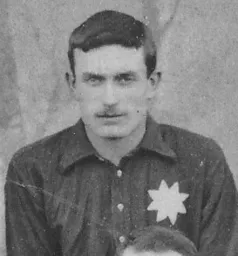After successfully going through the qualifying competition for the English Challenge Cup, winning all of their games with very considerable credit, the Luton Town Club had the honour of taking part in the first of the second series on Saturday last, the fortune of the draw allotting them Middlesbrough as opponents. The Luton Club, which is now in its seventh year of its existence, has entered the English Cup from the first, but this is the only time it has succeeded in getting beyond the preliminary contests. The farthest they had ever reached before was the semi-final, when their colours fell to the Old Brightonians. The members have naturally been much pleased at the enhanced importance this improvement in their fortunes has given them in the football world. Saturday’s engagement had been looked forward to with great anticipation, and speculation had been rife for some time as to the probable result. It was known that the Middlesbrough team was a rather formidable one, consisting as it does for the most part if not entirely of professional players, drawn from some of the best clubs in both England and Scotland, including Preston North End, Sheffield Wednesday, and the Heart of Midlothian. They consequently had advantages in the way of training which cannot be laid claim to by the Luton eleven, who as our readers are aware are merely amateurs, receiving remuneration only for the time they are engaged on the field. Their opportunities for practice are few, and indeed they seldom touch a ball from Saturday to Saturday. This being so it was recognised that the Luton men had a tough fight before them, and many would not have been disappointed had the result been similar to the fiasco which the match with the 93rd Highlanders last season resolved itself into.
Unfortunately the weather was all against good play. Perceiving that the state of the ground was utterly unsuited for the purpose, the Secretary of the Luton Club (Mr I. Smith) put himself in communication with the Association in London and endeavoured to get the fixture postponed; but he was informed that, according to the rules, the team would have to meet on the spot before the referee could decide whether the game should be gone on with or not. In the meantime a number of men were set to work to clear the snow off the ground. In this they were more successful than might have been expected, but the prolonged frost had rendered the turf extremely hard and all the scraping that could be employed failed to bring the icy covering entirely away. The referee, who was Mr T.G. Ashmole, of the Leicestershire FA], after inspecting the field thought there was not sufficient reason to postpone the match, and accordingly the game proceeded, though it was evident to everybody that the condition were very unfavourable for anything like scientific performances, and dangerous as well. For similar reasons the attendance of spectators was not nearly so large as would certainly have been the case had the weather been less rigorous. Not more than 1,200 lined around the ground, and the pavilion had even less than its usual number of beholders, which, considering that this was the most important engagement ever brought off in Luton, was not by any means satisfactory.
The teams were as follows:- Luton Town: Goal, J. Burley; backs, A. Sanders and J. Hoy; half-backs, J. Wright, H. Paul and A. Taylor (captain); forwards, F.K. Whitby, G. Deacon (right wing), H.W. Oclee (centre), W. Cheshire and H. Whitby (left wing). Middlesborough: Goal, H. Mackay; backs, R. Crone and J. McManus; half-backs, J. Copeland, J. Bell and T. Bach; forwards, D. Wilson and W.C. Campbell (right wing), D. Mullins (centre), G. Waller and D. Black (left wing). The linesmen were Messrs W.C. Cattell and J.T. Lewis, both of the Kettering Club, and the referee, as has already been stated, was Mr T.G. Ashmole.
Luton won the toss, and defended the Workhouse end, having a slight benefit from strong wind that was blowing athwart [across] the field. Mullins started the ball for the visitors at 25 minutes past 2. Some desultory shooting took place in the Luton territory, but the game had not been more than two or three minutes in progress when Middlesbrough obtained a penalty kick off Wright, almost right in front of the Luton goal. The ball was well placed by one of the half-backs, and after some good defence by the Luton backs, the leather went right between the posts unexpectedly bounded through off Campbell’s head. First blood was thus drawn by the visitors. But everybody felt it was more by good luck than skilful management. This rather discouraging start seemed to nerve the homesters to greater efforts, and for some time they played with commendable vigour. The ball was kept for the most part about mid-field. A good many free kicks took place for both sides. From one of these the home forwards carried the ball well up, Frank Whitby making a good run on the right. From a foul Wright also played the leather well in the mouth of goal, but it was cleverly headed out by one of the backs. After this the visitors worked their way up, but near the middle of the field, when their forwards were lining up finely, Sanders took the ball from them and relieved in grand style. Immediately afterwards Oclee did some good service, and the forwards working well together, Harry Whitby seemed to have things all his own way; but the treacherous nature of the ground destroyed his aim. Thereafter Deacon endeavoured to send the ball over his head, but it pitched on his toe and gave a fine opening to the visitors, whose backs were showing up in splendid form. Some scrambling play followed, Luton losing numerous opportunities, while their shooting was rather erratic. Their passing, also, was none of the best. It may, however, be said that their opponents showed to no better advantage in this respect. There was more kicking than passing, but probably they found that work of this kind was out of the question in such circumstances. After Hoy had sent the ball well into the visitors’ ground, and it had been returned, it remained about the middle of the field for some time. About this time Paul had a nasty fall, being fouled by one of the half-backs. The ball having been sent over to Harry Whitby, he ran it up and put in a fine shot, causing Mackay to use his hands in defence. Waller, Black and Mullins now did some really fine passing, and succeeded in eluding the half-backs. They did not count upon Sanders, however, that player very neatly ran round the two right wing men and made a splendid dash down the left wing. Oclee ,too, distinguishing himself this time by doing some capital individual play, and gave some work to the Middlesbrough goal-keeper. Taylor was also doing useful service on the left. One of the visitors’ backs having charged Oclee, a foul was given against Middlesbrough; this gave Luton a look in at their opposing goal, in the vicinity of which some close work took place, but the Middlesbrough backs were too strong for the home forwards, and the ball was eventually brought down the field again. Several more penalty kicks fell to Luton about this time, but were unproductive. Then a little more excitement took place. The visitors’ forwards by a combined rush took the ball well up, but Hoy going in robbed them of the leather, though only at the expense of a corner - the first in the game. The ball was beautifully paced by one of the half-backs, but it was kicked out; it was immediately returned, striking one of the uprights, rebounding into play, and Bell securing it put in a stinging shot, the sphere passing through quite out of Burley’s reach and putting on a second goal for Middlesbrough. During the few minutes remaining of the first part a hard tussle took place in the centre of the field, Deacon and Frank Whitby showing some good form, and Harry Whitby should have scored from a splendid chance that was given him but he was unable to do so, no doubt owing to the slippery foothold. A moment or so afterwards the whistle indicated that the time for the interval had arrived, and so the first half of the game ended with the score standing rather badly against the home team - Middlesbrough two, Luton nil. After a five minutes’ breathing time the opposing sides again faced each other, the strangers now having the benefit of the wind. The chief feature of the second 45 was the manner the players from the iron town occupied the Luton territory. It was noticed, however, that though they could use the head dexterously and to good purpose, they were inclined to make rather too long shots. Immediately after the re-start the home goal was hotly bombarded, but Burley and his companions at the rear were equal to the demands made upon them. Very smartly did Hoy stop a combined rush once, and placed the ball well up the field, a piece of work for which the onlookers generally complimented him. Another good run by F. Whitby ended in the ball going out, Crowe (who made a most efficient back for the visitors) proving too much for him. Soon after this Wilson obtained possession and put in a grand shot, but Sanders, who is usually to be relied upon, relieved. About this time the Luton colours were again lowered but, as on the first occasion, in a rather fluky fashion. Bach, taking the leather from one of the Luton forwards near mid-field, took it through the Luton ranks in an unaccountable easy manner and sent it home. Burley actually handled the ball and was on the point of throwing it out when he chanced to slip, and as he fell the ball slipped from his hands and rolled gently under the bar. Things were now looking rather gloomy for the “straw” men, as our friends at a distance innocently term them. But they were in no way disheartened. They set to work with renewed activity and dash, and during the next ten minutes they entirely changed the scene of operations from their own to the opponents’ ground. Cheshire and Harry Whitby had a good run until they were stopped by McManus. Shortly after this it looked as if Luton were to score, but hands were given against them; the free kick was taken by Crone, who placed well, but nothing came of the incident. McManus was after this pressed hard by H. Whitby and conceded a corner, but the advantage was thrown away. Ten minutes before the end Cheshire and H. Whitby brought the ball up well on the left, and from the way it was centred it should certainly have been put to good account, but F. Whitby somehow mulled it. Play having once more been shifted to the home ground, a free kick was given against Luton, and the ball was actually put between the posts, but a little cheer of derision went up from the home team’s sympathisers when the referee brought the leather back again and it was discovered that in their haste the visitors had kicked it from the wrong spot. One or two corners followed, at both ends of the field. When the Luton men were pressing a scrimmage took place in front of their opponents’ goal, and the Whitbys very nearly succeeded in scoring. Mackay being so warmly assailed that he had to pass the ball behind in order to save his charge. Immediately after the ball had been brought into play again another vigorous assault was made on the visitors’ goal, and Cheshire managed to put in a hot low shot which passed on the wrong side of the post by only two or three inches. In the last minutes of the match nothing worthy of notice happened, and time was called with the score standing :-
Middlesbrough 3
Luton 0
Both sides were heartily applauded as they left the field. Though defeated, neither the home team nor their supporters were at all disheartened, for they had been fully prepared for a beating, and, considering the hard luck they had had, the score was not regarded as at all distressing.”












